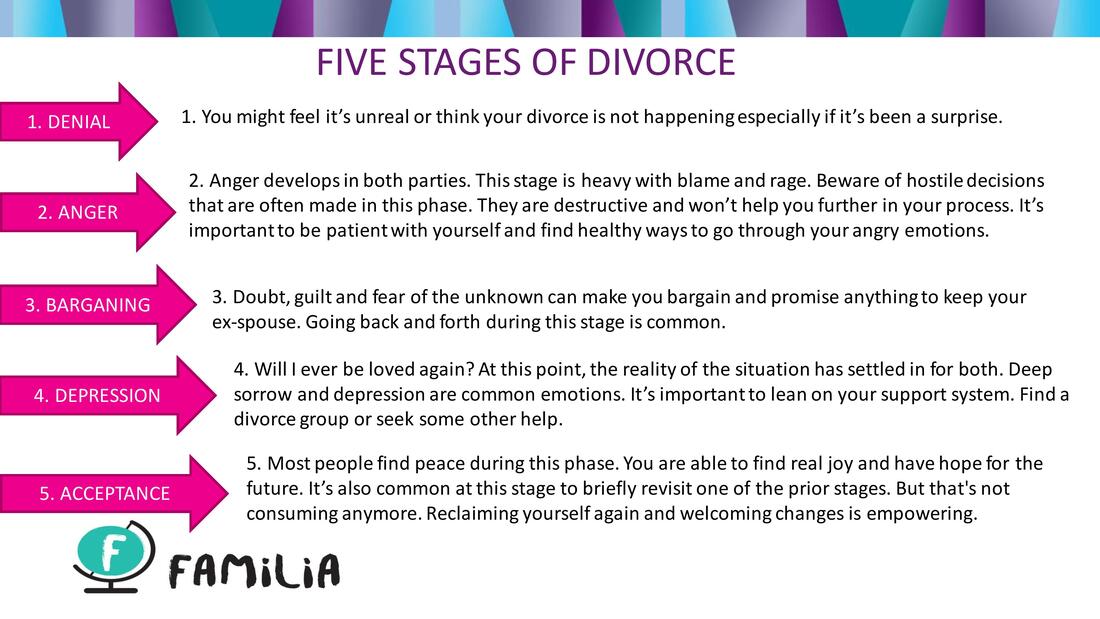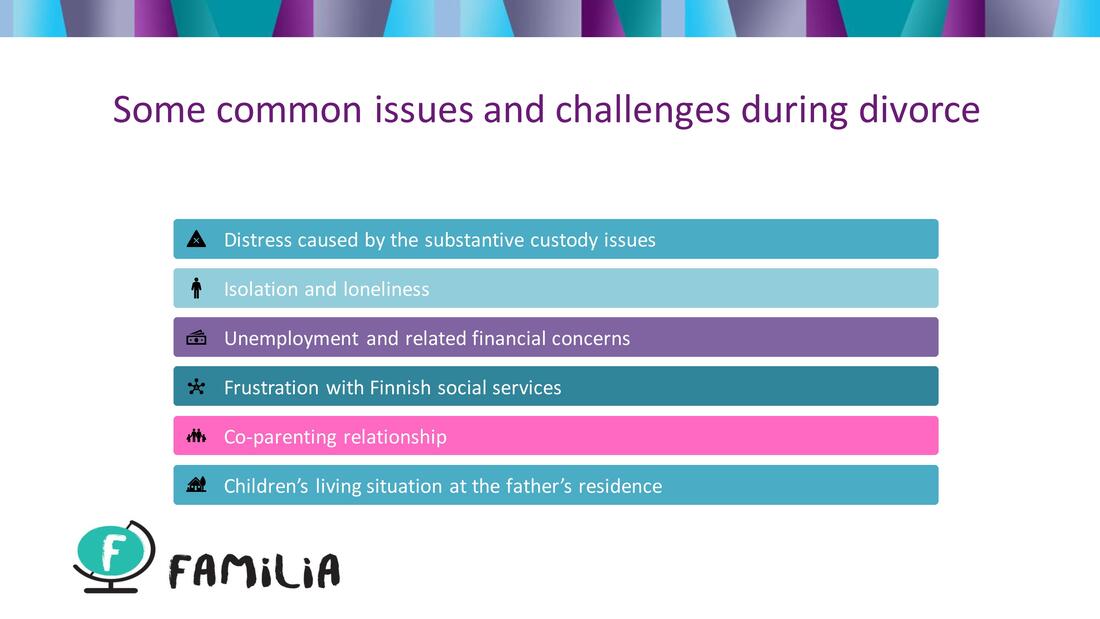Divorce can cause feeling lonely, isolated, vulnerable, helpless, exhausted. I didn't get any support. I was in a dark place for a while because I was not familiar with divorce, I tried and held on a broken marriage too long and it took me a while to get myself back. |
QUICK LINKS
|
It can be quite overwhelming to deal with all the practical issues of divorce while feeling lost, isolated and struggling the emotional side of divorce. To understand what happens to most people going through a divorce, this theme discusses the stages of grief and how to take care of yourself during the process.
divorce is a process
Most difficult time of my life. Legally it was pretty easy.. as long as both parties do not have grudges and agree to the divorce document. Mentally and emotionally devastating being of "old background" where people get married and stay married for better or worse". It was terrible, heartbreaking. Tragic. When you choose to end your marriage, you’ll journey through conflicting emotions, ranging from relief to doubt. Divorce is one of the biggest life changing experiences and often one of the most hurtful ones.
Most people describe divorce as a roller coaster. To cope, you’ll need to rely on friends, family, and your social community. The support they will offer is important for your healing process and you should welcome it. Now is the time for you to take care of yourself. Getting through a divorce is always a process that involves different emotions. Often people tackling divorce have been described going through the 5 emotions of grief: 1. Denial, 2. Anger, 3. Bargaining, 4. Depression and 5. Acceptance. Each stage brings up different emotions and you need to find a way to go through them no matter you initiated the divorce or not. Some stages take longer than others, some overlap and some might take quite a while and going back and forth is also common. 
Whether you are the initiator or not, you will experience some degree of these kind of stages of grief. Understand that it’s normal and allow yourself to take your own time. Some stages overlap and the feelings vary from day to day. But after each downfall you are a bit further in the process.
Taking care of myselfGoing through a divorce can turn your world upside down and make it hard to get through the day. To take care of yourself, keep these in mind:
Different feelings are OK. It’s normal to feel sad, angry, relieved, exhausted, light, frustrated, confused… Grieving is also a part of the process; you have lost something valuable. You also may feel anxious about the future. Accept that reactions like these will lessen over time. You can start by naming your emotions. Even if the marriage was unhealthy, venturing into the unknown is always frightening. Give yourself a break. It is OK if you don't function at your best level for some time. You aren't maybe as productive or care for others in exactly the way you’re accustomed to for a little while. Take time to heal, regroup and re-energize. Don’t go through this alone. Sharing your feelings with friends and family help you get through this. They want to help you. Consider joining a support group where you can talk to others in similar situations. Don’t be afraid to get outside help if you need it. Be kind to yourself. Take care of yourself emotionally. Keep to your normal routines. Try to avoid making major decisions or changes in life plans. Do little things for yourself that make you feel good - every day. It is going to take a while and setbacks are a part of it. You can’t hurry it but you keep going to the right direction every day. Forgiving and letting go will be steps forward but they don't happen suddenly. Take care of yourself physically – Be good to yourself and to your body. Take time out to exercise, eat well and relax. Whether it is walking, jogging, swimming, soccer, gym – find your way to keep your body active. Your mind will feel better too. Avoid arguments with your ex-spouse. If a discussion begins to turn into a fight, calmly suggest that you both try talking again later. Get back to it when your are calm again. Don't involve the kids – don’t let kids feel they’re caught between you two and don’t talk bad about the other. Family traditions will still be important but some of them may need to be adjusted. Help create new family activities. Take time to explore your interests. Reconnect with things you enjoy doing apart from your spouse. Have you always wanted to learn Spanish or play padel? Sign up for a class, invest time in your hobbies, volunteer, and take time to enjoy life and make new friends. Think what you’d like to become – with all the self-reflect and self-knowledge, you can find a new path for your life. Things may not be the same, but finding new activities and friends, and moving forward with reasonable expectations will make this transition easier. Things will get back to normal - your new normal that will be different but maybe also better. Change gives always the possibility to grow. SOME INTERCULTURAL ISSUESMany struggles are common for divorcing couples everywhere whether taking care of yourself emotionally or practically, like finding solutions to financial and living questions. Some challenges are faced more in intercultural divorces, and some are more common among the non-Finnish spouse’s side.
During divorce foreign born ex-spouses experience more identity struggles and often feel loss of belonging or caught between two cultures and countries. Language barriers and the sense of discrimination are also common. I didn't get any information because I had a little experience about Finnish law." It was scary since I was here on family-based residence permit and wondered if I'd need to leave the country or not." Most of the information came from my ex. Social services helped with our specific issues, and this pathway was initiated by my therapist." I was concerned about being able to keep an equal parenting role for my child. I sought some private legal advice to calm my fears! And in the end it was all dealt with very fairly by the Finnish process." Sorting practicalities step by step will help you to start feeling empowered again. Try to find a peer group for emotional support and lean on your social circles. Keeping in touch with your family and friends in your home country as well as with friends in Finland prevent from feeling isolated.
There are plenty peer groups online, try finding one suitable for you. In Helsinki area there are also English speaking support groups (ask from your local perheneuvola) to get through this. Seek for help; there are many organizations that offer help and advice for you find a way and to go on. Don't get discouraged if you can't find the support you need immediately. You are not alone. The last section of this online course lists links for help and support. “Find organisations that help. Don’t think that you alone! And DON’T involve your children in the anger/hate/bitter feelings for your ex, it is not their fault!!!” |
Two stories of going through 5 stages
Here you can see two different personal stories reflecting their journey going through the divorce process in practice.
|
What helped you to get through your intercultural divorce here in Finland?
"Talking to family and friends."
"I needed time."
"My friends were amazing sources of support and strength. Having access to financial support from Kela was critical."
"Fisher's divorce seminar peer group. And at last, when things were quite problematic already, I found the Association for Abducted Children Finland (Kaapatut lapset ry)."
"Therapy and friends."
"Eron ensiapu. Domestic violance unit Omatila."
"Counselling. Sick leave, antidepressant 6 months. Peer support group. Friends. Talking. Hobbies, exercise. Forgiveness."
"Life continues."
"The support systems are not easy to find as a foreigner. Luckily I have integrated quite well and had good support through friends."
"Be loving towards myself, my kids and my ex."
Every divorce is unique to the situation but by listening to others who have gone through divorce or separation, you can usually find similarities and have comfort that others have gone through the same type of emotions wherever they have happened. Online you can find many stories for peer support. Here are 4 very different individual stories of divorce shared in Youtube telling what they have felt during divorce and what they have learnt.
for self-REFLECTion and homework
- If you didn't list all the practicalities in theme 1, do it now to know what still needs to be done in practice.
- Take a moment and think a healthy way that helps you to go through your grief and anger. What helps you to reflect? It's good to sort out different emotions and name them. For many writing down your feelings and emotions is helpful: put down streams of thought, keep a journal or list your feelings. Writing often helps you to regonize your emotions, sort them - and finally let go. You can also be listening to music, going for walks in the nature or talking to friends or peer group - find the different ways you can sort out your emotions in peace and self-reflect. Don't brush or push them aside - listen to yourself and find your own hopes and dreams again. The better you know yourself and the underlying reasons for your divorce, the easier it is to go forward.
- What are the small things that make you feel good? How do you take care of yourself? A trip to the gym, having a sauna, buying flowers, seeing a friend, reading a book... what ever it is, do one or several every day - take care of yourself. Your well-being is the priority now.
- Who are in your support group? Seek out to your friends and family. Find a peer group, organization or a therapist that helps you to share and talk.
more material
There are dozens and dozens books written about a divorce and how to get through it. Library is a great place to start, if you look for more reading material. One of the most famous ones is Rebuilding - when your relationship ends by Bruce Fisher which is also the orginal basis of the support group Suomalainen eroseminaari.



